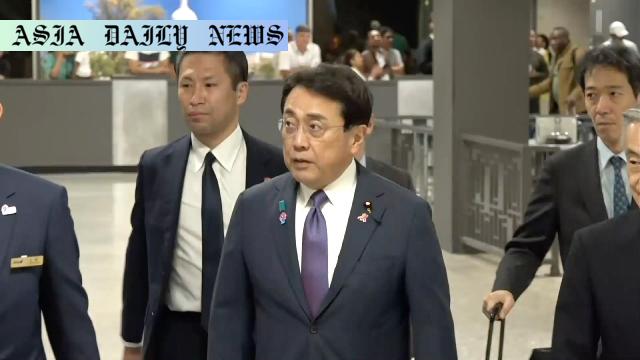Tariff Negotiations: Japan aims to resolve pressing economic challenges through mutually beneficial discussions with the US.
Japan seeks a win-win solution in ongoing tariff negotiations with the US.
Minister Akazawa emphasizes restructuring tariffs to support both Japan’s and US’s economic interests.
Promotes Japan’s investments as beneficial to the American economy and trade harmony.

Japan’s Strategic Focus in US Tariff Negotiations
As global trade dynamics evolve, Japan finds itself navigating a delicate yet significant aspect of its economic relationship with the United States: tariff negotiations. This week marks the second round of direct discussions, with Japan’s Economic Revitalization Minister Akazawa Ryosei taking a leading role in advancing mutually beneficial resolutions. Having recently arrived in Washington, Akazawa’s mission is centered on fostering a win-win agreement, highlighting the impracticality of America’s current tariff policies. These tariffs, as emphasized by Akazawa, are inflicting considerable damage on Japan’s economy, creating urgency for a collaborative solution.
Japan’s strategy is clear – seek fairness while underscoring its substantial contributions to the American economy. Akazawa aims to persuade US Treasury Secretary Scott Bessent of the broader advantages of increased Japanese investments in the United States. Japan envisions a trade partnership where both nations leverage their economic strengths harmoniously, achieving global competitiveness while resolving the imbalance that President Donald Trump has prioritized during his presidency.
Japan’s Domestic Endorsement for Constructive Agreements
Within Japan, Prime Minister Ishiba Shigeru expressed robust support for Akazawa’s efforts. The prime minister stressed the importance of avoiding a zero-sum perspective, instead championing a collaborative global role for both nations. His guidance underscores that these negotiations should embody mutual respect, diplomatic finesse, and a shared commitment to global economic stability. Akazawa, in preparation for the high-stakes talks, even convened with strategic figures from Japan’s ruling Liberal Democratic Party to align his approach.
The stakes are particularly high, given the US administration’s focus on reducing trade deficits. Japan must tactically illustrate how an equitable trade partnership can benefit domestic industries on both sides, promoting prosperity instead of perpetuating economic strain. By aligning policies creatively and strategically, Japan’s negotiation team has the potential to secure a balanced outcome that empowers both economies.
Balancing Tariffs and Trade Deficits
A critical underlying theme of the discussions is the resolution of America’s trade deficit concerns. President Trump’s administration has consistently called for an end to these imbalances, but Japan argues for a more nuanced perspective. Tariffs, while initially seen as tools to regulate imbalances, have far-reaching implications that affect economic prosperity across borders. Echoing Akazawa’s arguments, Japan emphasizes the collateral damage these tariffs inflict on vital trade channels, manufacturing networks, and industries heavily reliant on seamless US-Japan operations.
Central to the ongoing talks is also identifying mutually beneficial industries where Japan can increase its investments in the US. This includes areas such as technology, automotive manufacturing, and renewable energy. By emphasizing tangible collaboration, Japan can highlight how a stronger partnership achieves balance and helps both nations address domestic economic priorities.
A Path Forward in Trade Harmony
Japan’s ultimate goal is profound: establish a precedent-setting model for trade negotiations where neither side emerges as a winner or loser. By framing discussions around shared global responsibilities, Japan hopes to set the stage for sustainable economic policies that prioritize mutual gains. As outlined by Akazawa, this requires both countries to recalibrate their trade philosophies to maintain long-term global competitiveness.
As Akazawa and US Secretary Bessent meet later this week, their ability to articulate and embrace shared economic narratives could redefine how tariff disputes are addressed. Their collaboration represents an opportunity to demonstrate that diplomacy and negotiation can still thrive amidst challenges, fostering economic sustainability that extends beyond borders.



Commentary
The Significance of Trade Harmony
The ongoing tariff negotiations between Japan and the US bring to light a critical theme within international trade: the necessity of equitable partnerships. In an era defined by global interdependence, no economy can operate in isolation. The negotiations spearheaded by Economic Revitalization Minister Akazawa Ryosei underscore just how vital it is for nations to recognize their mutual benefits rather than myopically pursuing their own gains.
Japan’s approach to these discussions showcases the country’s astute understanding of diplomatic engagement. By prioritizing a win-win model, Akazawa is advocating not just for Japan’s economic stability but also for a sustainable trade environment that promotes innovation and fair competition. This approach reflects a broader vision for how nations should navigate complex economic challenges, fostering collaboration without compromising sovereignty.
Challenges and Opportunities in Trade Negotiations
However, challenges persist. The US’s focus on eradicating trade deficits stems from genuine economic concerns, yet the imposition of broad tariffs does not entirely address the multifaceted nature of trade imbalances. It is here that Japan’s emphasis on investments, resource sharing, and technology exchange becomes particularly relevant. By reframing the narrative, Japan offers a constructive alternative—one that connects economic policies to tangible benefits for sectors and communities on both sides.
As we observe the week’s developments, it is essential to recognize that these negotiations bear significance not just for Tokyo and Washington but for the broader international community. A successful outcome could serve as a blueprint for resolving trade disputes elsewhere, proving that diplomacy remains the most effective solution in a world increasingly tempted by unilateralism.
Optimism for Economic Collaboration
Ultimately, one cannot help but be optimistic about Japan’s measured and proactive stance. Amidst a backdrop of rising trade tensions globally, Japan’s emphasis on shared responsibility and mutual economic interests provides a much-needed reminder that international trade is not a zero-sum game. The hope is that negotiations such as these set a tone wherein collaboration, not competition, becomes the defining feature of economic relations in the 21st century.